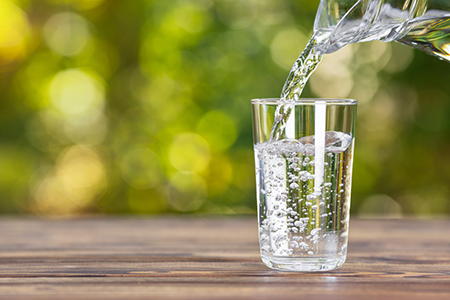
Most of us eat and drink too many added sugars, which can lead to significant health problems. Sugary drinks are the leading source of added sugars in the American diet.
What are sugary drinks?
Sugary drinks (also known as sugar-sweetened beverages) are any liquids that are sweetened with added sugars. Beverages such as regular soda (not sugar-free), fruit drinks, sports drinks, energy drinks, sweetened waters, and coffee and tea beverages with added sugars are sugary drinks.
Why should I be concerned about sugary drinks?
People who often drink sugary drinks are more likely to face health problems, such as weight gain, obesity, type 2 diabetes, heart disease, kidney diseases, non-alcoholic liver disease, cavities, and gout, a type of arthritis.
Limiting sugary drinks can help you maintain a healthy weight and have a healthy diet. Many people don't realize just how much sugar and how many calories are in their drinks.
| Drink (12-ounce serving) | Teaspoons of sugar | Calories |
| Tap or bottled water | 0 teaspoons | 0 |
| Unsweetened tea | 0 teaspoons | 0 |
| Sports drinks | 2 teaspoons | 75 |
| Lemonade | 6 1/4 teaspoons | 105 |
| Sweet tea | 8 1/2 teaspoons | 120 |
| Cola | 10 1/4 teaspoons | 150 |
| Fruit punch | 11 1/2 teaspoons | 195 |
| Root beer | 11 1/2 teaspoons | 170 |
| Orange soda | 13 teaspoons | 210 |
Adapted from We Can!
Tricks to rethink your drink
Choose water (tap, bottled, or sparkling) over sugary drinks.
- Need more flavor? Add berries or slices or lime, lemon, or cucumber to water.
- Missing fizzy drinks? Add a splash of 100% juice to plain sparkling water for a refreshing, low-calorie drink.
- Need help breaking the habit? Don't stock up on sugary drinks. Instead, keep a jug or bottles of cold water in the fridge.
- Water just won't do? Reach from drinks that contain important nutrients such as low fat or fat free milk, fortified milk alternatives, or 100% fruit of vegetable juice first.
- At the coffee shop? Skip the flavored syrups or whipped cream. Ask for a drink with low fat or fat free milk, a milk alternative such as soy or almond, or get back to basics with black coffee.
- At the store? Read the Nutrition Facts Label to choose drinks that are low in calories, added sugars, and saturated fat.
- On the go? Carry a reusable water bottle with you and refill it throughout the day.
- Still thirsty? Learn how to drink more water.
Remember that you can be a role model for your friends and family by choosing water and other healthy, low-calorie beverages.
